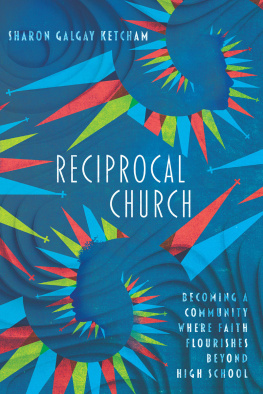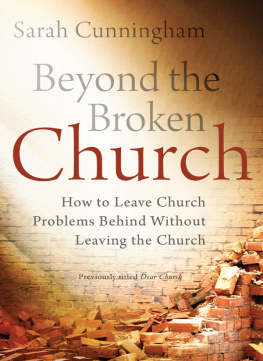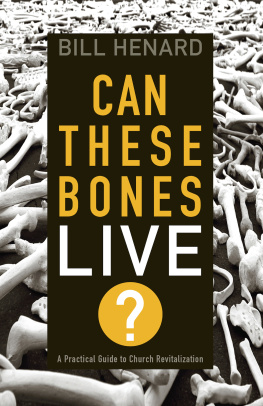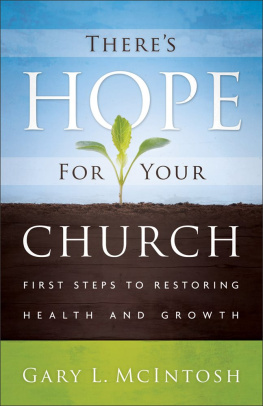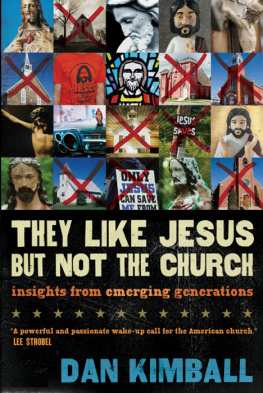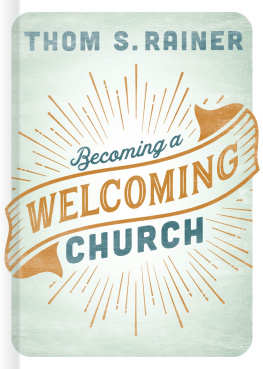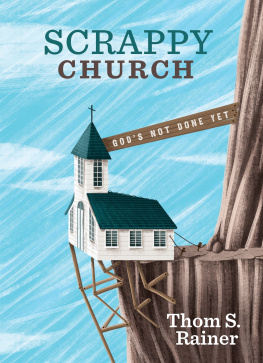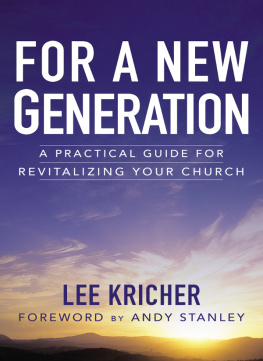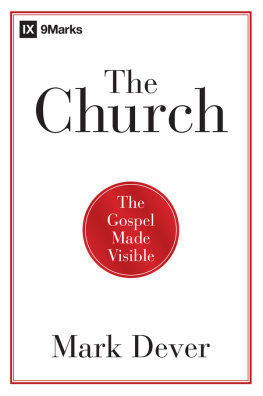
CHURCH REFUGEES
Sociologists Reveal Why People Are Done
With Church but Not Their Faith
Copyright 2015 Josh Packard and Ashleigh Hope
group.com
All rights reserved. No part of this book may be reproduced in any manner whatsoever without prior written permission from the publisher, except where noted in the text and in the case of brief quotations embodied in critical articles and reviews. For information, visit group.com/permissions .
Credits
Senior Editor: Candace McMahan
Copy Editor: Christy Fagerlin
Cover Art Director: Darrin Stoll
Interior: Andy Towler
ISBN 978-1-4707-2677-5
TABLE OF CONTENTS
CHAPTER 1:
The Dechurched as Religious Refugees
CHAPTER 2:
Community and Judgment
CHAPTER 3:
Activity and Bureaucracy
CHAPTER 4:
Conversation and Doctrine
CHAPTER 5:
Meaningful Ministry and Moral Prescription
CHAPTER 6:
Being the Church No One Wants to Leave 9
CHAPTER 7:
Church for the Dechurched
ACKNOWLEDGMENTS
As academics, we dont often get to write for a general audience, but I was cheered on by my fantastic colleagues at the University of Northern Colorado and friends and mentors Dr. Richard Pitt at Vanderbilt University and Dr. George Sanders at Oakland University. My wife, Megan, who has never read a word of anything Ive written, never needs to, as far as Im concerned. Her influence is felt throughout this project. I couldnt ask for a better partner in life, and our son couldnt ask for a better mother.
I couldnt have written this book without Ashleigh Hope. Indeed, this project may very well have sat on my shelf for many more years if she hadnt come along and asked for some work to do. Shes a once-in-a-lifetime student whom Im proud to have as a colleague. There are, no doubt, more great things to come from her.
Josh Packard
I would like to thank my Savior for making all things new and continuing the good works hes begun within me. Additionally, Im grateful for my beloved husband, Kyle, for encouraging me in this research and all others. His support and insight have been invaluable.
Ashleigh Hope
We would both like to express our gratitude for the amazing team at Group Publishing. Theyve been invaluable. Thom Schultzs willingness to meet with us following an unsolicited email is behavior not normally associated with presidents of large companies. He and his wife, Joani, have championed this project from the beginning. The concept of the refugee as a metaphor first came up in conversations with Amy Nappa, and the writing and publishing process was demystified and smoothed out by an extraordinary group of professionals at Group Publishing consisting of Craig Cable, Mikal Keefer, Becky Hodges, and Candace McMahan, among others.
Finally, were both deeply indebted to all who shared their stories for this research. Their honesty and vulnerability made this book possible.
FOREWORD
A few years ago, in the course of collecting data for a different project, I (Josh) had the occasion to talk with some church planters and ministry resource leaders over lunch. In some way or another, they all wanted to know why so many people were leaving the church. Finally, one relatively new pastor asked the group, So whats different about this era that so many people are leaving the church? What happened?
As I began to formulate some kind of answer based on all of my recently completed graduate schooling in sociology, Jessica, a woman who had been working in ministry-resource publication for over two decades, spoke up: Nothing. People have always been leaving the church. Its just that now theyre not coming back. Thats the real issue. Were doing things that drive people away from the church. Were the problem. Weve dechurched them. Theyre done with us.
Jessicas words hung over the table for a few seconds that felt like hours before I broke the uneasy silence by asking, So, what do you all think? Is Jessica right? Of the people you know whove left, do you think theyre coming back? Do you know why they left?
One by one, they all revealed that, indeed, they didnt think any of the people who had left their congregations would be coming back with the exception of a general and vague hope that young people going off to college would eventually return. Instead, they related story after story of people who had left their congregations after prolonged struggle, searching, and sometimes incredibly harmful and divisive experiences.
As they recounted the reasons people had given them for leaving their churches, I heard about pastors behaving poorly; churches focused so much on buildings and infrastructure that they neglected the outside world; unwanted and distracting political stances; perceived persecution over issues of gender and sexuality; hypocrisy; and many, many stories about judgment.
They werent recounting the transgressions of an anonymous church down the street or of friends who pastor congregations in other towns. These were stories that pastors and other church leaders were telling about their own congregations. These were things that happened on their watch, despite their best intentions. It remains, several years later, among the most revealing moments Ive ever encountered in my research.
Aside from being heartbroken to hear these stories of hurt, disillusionment, and bitterness at the hands of trusted people in a trusted institution, I was intrigued sociologically. What, for example, did Jessica mean by dechurched? Who are these peoplethe Donesand how do they make the decision to leave the church? Does their leaving accompany a loss of faith in God or a change in religious affiliation? Furthermore, how can we understand the institutional forces that seemingly work to compel poor behavior from a group of well-meaning pastors working in organizations with the explicit mission to be loving, just, and compassionate?
As so often happens in the course of research, these questions werent central to the project I was working on at the time, and so I filed them away, but they were never far from my mind. As I began teaching Sociology of Religion courses on a regular basis, I heard more and more stories similar to the ones those religious leaders had told me. Typically, students would recount their negative experiences with organized religion after class or during office hours as we worked to apply a particular theory or reconcile some empirical evidence wed been reading with our own personal experiences.
Again and again, I returned to this concept of the dechurched and the Dones, and increasingly, my own students were using it to describe their experiences. In the midst of these thoughts, my research assistant, Ashleigh Hope, approached me and said, We should really look into this. Why is church so bad to some people? And more important sociologically, what happens to our society if this central institution continues to drive people away?
This book was born out of those questions. Primarily, were interested in understanding precisely what it means to be done with organized religion, uncovering its effect on the institution of religion, beginning to assess what social forces are driving this trend, and what it means for the future of such a historically important institution in the United States.
More personally, we have a heart for the church and want it to succeed, though we arent particularly sympathetic to any specific form of church, institutional or otherwise.
Next page

